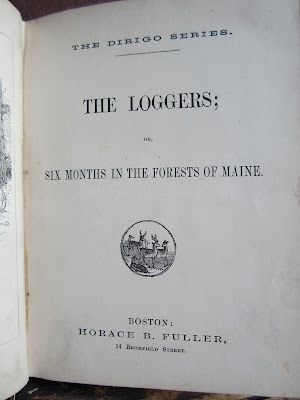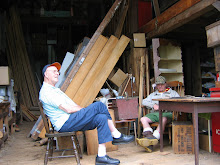The Loggers, Or Six
Months In The Forest Of Maine
A Rare Maine Book
(Fuller, Horace B., presumed
author), THE DIRIGO SERIES. THE
LOGGERS; OR, SIX MONTHS IN THE FORESTS OF MAINE. Horace B. Fuller, 14 Bromfield Street, Boston, (1870). (1-2, frontis plate), (1-7), 8-75, (76,
blank). First edition. Ill.. Rust-orange deckled publisher’s cloth with Eastlake
Victorian style ornamental title printed in gold on the front. Interior text is lightly shaken, fly
leaves cracked at gutters, text has light age toning, has minor child read -
thumbed through feel to whole, penciled 1888 owner’s name on front fly leaf
with matching name ink stamped on blank rear of frontis plate, both
attractive. Covers age toned, dust
soiled, spot soil stained and worn on all edges with spine sun faded, worn and
moisture damage being in total a truly appropriately read-by children “rare
juvenile”. Williamson 5538 (by title), Smith/LUMBERING pg. 12 at page
bottom. $1,250.00.
After
finding the book and… recognizing it when I found it to be the rare Maine book
it is, I spent a whole week trying to recall how and where I had found out
about the book. Williamson I
ignored after checking for “Fuller”.
Smith (David C., LUMBERING AND THE MAINE WOODS: A BIBLIOGRAPHIC GUIDE,
Maine Historical Society, Portland, Me, 1971) I… pulled off of the shelf in my
office after at least a 25 year undisturbed rest and flipped through it
cavalierly with a “MUST BE IN THIS” attitude. I did not see it mentioned and became absorbed in reviewing
my own penciled marginalia denoting “rare Maine books” done by my hand decades
ago. “Huh.” concluded this
effort. A week later I revisited
the bibliography after making no progress elsewhere and coming around again to
the “MUST BE IN THIS”. It is. I found it. Way at the bottom of page 12 carrying to the top of page
13. It had no marginal pencil note
in my hand scoring it as “rare”.
But. I GUESS this is where
I originally “heard of” this truly rare Maine book?
Finding
the book was fun. The coastal
Maine house was old but they’d “moved into it” after their parents finished
“using it” and “moved to Florida”.
This… bought from the original Victorian Maine family… home’s second
family occupation neared eighty years.
“ALL” of the “OLD STUFF” from THAT first family had been “CLEANED OUT”
by the parents “YEARS AGO”.
Therefore “THERE IS NOTHING UP THERE” I was told regarding the second
floor of the two story shed that I was standing in and… having the opportunity
to “buy all of” “this is our parent’s stuff we don’t want”. I went up anyway. MORE “our parent’s stuff” …in “gone
through” disarray covered the second floor. Jumbled old books were mounded amongst the disarray. Poking and peeking at these and
selecting only the thin books to review… there THIS book was before my eyes
before I even got started. I HAD
noted that the books were from western Pennsylvania and THIS book TOO, was from
there but … was about logging in Maine… at the start of the Civil War. Knowing the value of the book to be
high, I put it back into its disarray, clambered back to the first floor and
“negotiated”
“All,
including ALL of the second floor” for a “THIS MUCH” offer in “CASH”. There was not… actually… that much
“stuff”; nothing big (in size) and most of it being “gone through” boxes packed
out of the house “years ago”.
Their murmur amongst selves was to suggest that they would like “more”
cash but I sensed this was a faint.
It was. They caucused while
I waited outside. “Accepted” they
said as a group after stepping out of the building. I cell phoned for a second truck “on the way”, paid in cash,
stated the building would be “empty in two hours” and then… skipped up the
stairs, purloined THIS BOOK from its pile and put it in my truck right up front
on the seat “next to me”.
The
…I read the book carefully and critically… contents meets the Smith’s
superlative comment “A rare juvenile which is very valuable”. Although not published until “1870” the
text, noted through careful reading, was actually written about 1859-1861. This dating is found in its early in or
pre Civil War side comments. The
narrative is purveyed as a series of letters written by a young …going to
college next fall… boy to his going to college next fall too chum. The boy in the Maine woods has been
sent there for his health by his uncle who is a lumber man who feels his city
boyhood needs to be toughened up.
A winter at a remote logging camp is just the thing for him. Although a constant sub theme of the
book… it is NOT INTRUSIVE to the narrative. In fact the narrative is carried right around ANY intrusion
of Victorian melodrama, rich boy saga, boss’ kid saga and even the Native
American Maine guide babysitter stereotype… that is NOT a stereotype because
THIS IS what Native American Maine guides DID DO in those day; get hired to “teach
the boy woodcraft”. IT IS carried
right around ALL of that by… being a true remote Maine logging camp “obviously
real” narrative record. Aside from
not actually stating where the boy peed in the woods, the ALL of first era
“long log” logging of both primary actions; the all winter long forest logging
camp life and the spring river drive the logs to the sea epic, are precisely
revealed in very satisfying narrative prose that WILL send the reader hunting
up a map to “find this place” and that reader WILL be able to do that to have
full satisfaction that “YEP: THIS IS REAL”. That includes moose hunts, bear hunts, deer hunts and all
woodcraft notice as “the boss’ son” AND all truly Maine Woods logging including
windlassing the log boom across the lake and …returning the crushed logger’s
body to his family… all carefully portrayed with no stark truth glossed over
AND a heavy handed salt and peppering of aside facts too. Therefore again; very real reading AND
meeting Smith’s “very valuable”.
The actual location?
Monument Brook, the lakes below and then down the St. Croix to the sea
with a sporting vignette west to West Grand Lake.










No comments:
Post a Comment